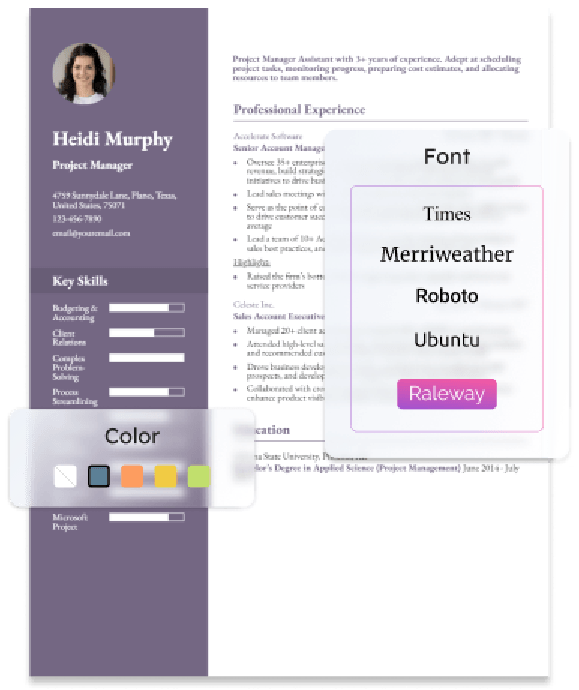To write a results-driven network engineer resume, demonstrate your ability to design, implement, and maintain network infrastructure. Show prospective employers you have what it takes to prepare for potential issues and handle them as they arise while emphasizing the most compelling aspects of your technical expertise and leadership capabilities. Throughout this guide, we’ll provide expert strategies to help you create an engaging resume showcasing your most impressive accomplishments in the information technology (IT) industry.
Network Engineer Resume Templates and Examples (Download in App)
Network Engineer Resume Example
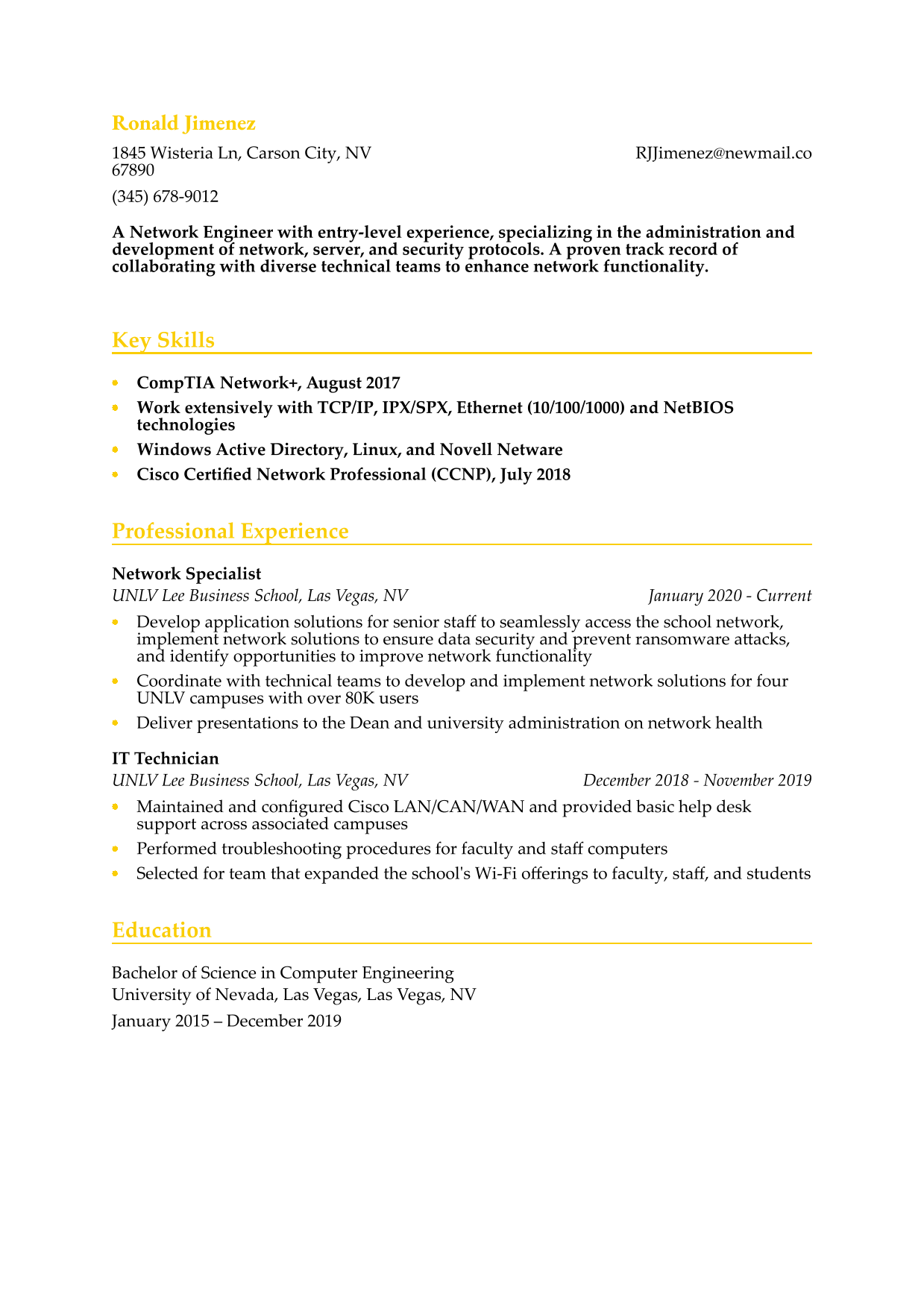
Why this Network Specialist resume example is strong:
This entry-level resume effectively showcases key networking skills like TCP/IP and experience with Cisco and Active Directory, which are essential in the IT field. The candidate's hands-on skills are evident with concrete examples, such as troubleshooting and expanding Wi-Fi, supporting credibility in a technology-focused role. The well-defined resume skills section highlights technical competencies for hiring managers to assess qualifications quickly.
Systems Network Engineer Resume Example
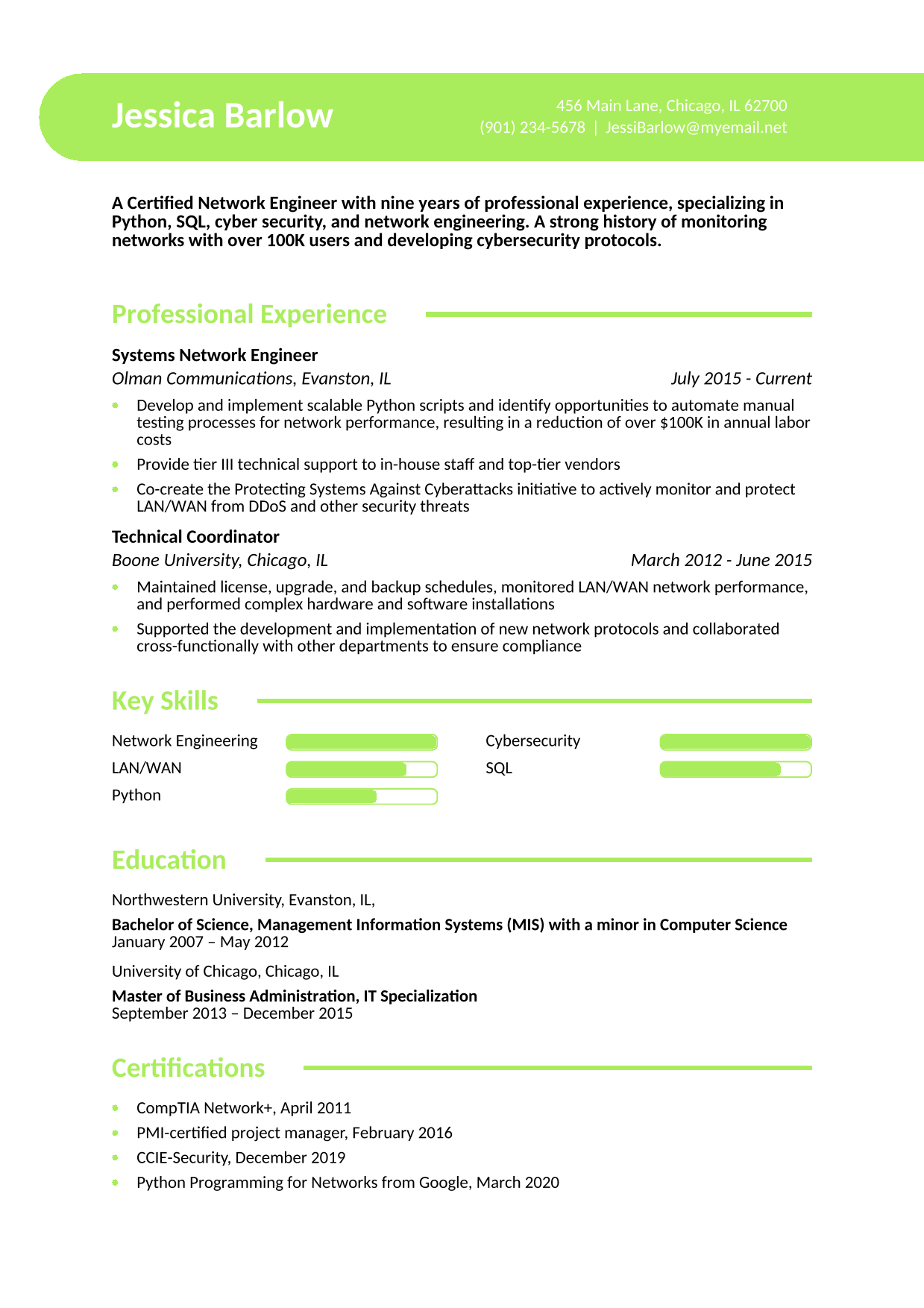
Why this Systems Network Engineer resume example is strong:
This resume highlights technical knowledge in Python, SQL, and cybersecurity, paired with impactful achievements in network security and automation, which are essential in a mid-level network engineering role. By showcasing cost-saving measures and cybersecurity protocol development, the resume reflects a problem-solving approach that is valuable to employers. The addition of relevant resume certifications boosts credibility, particularly for security-focused roles, making this resume stand out.
Senior Network Engineer Resume Example
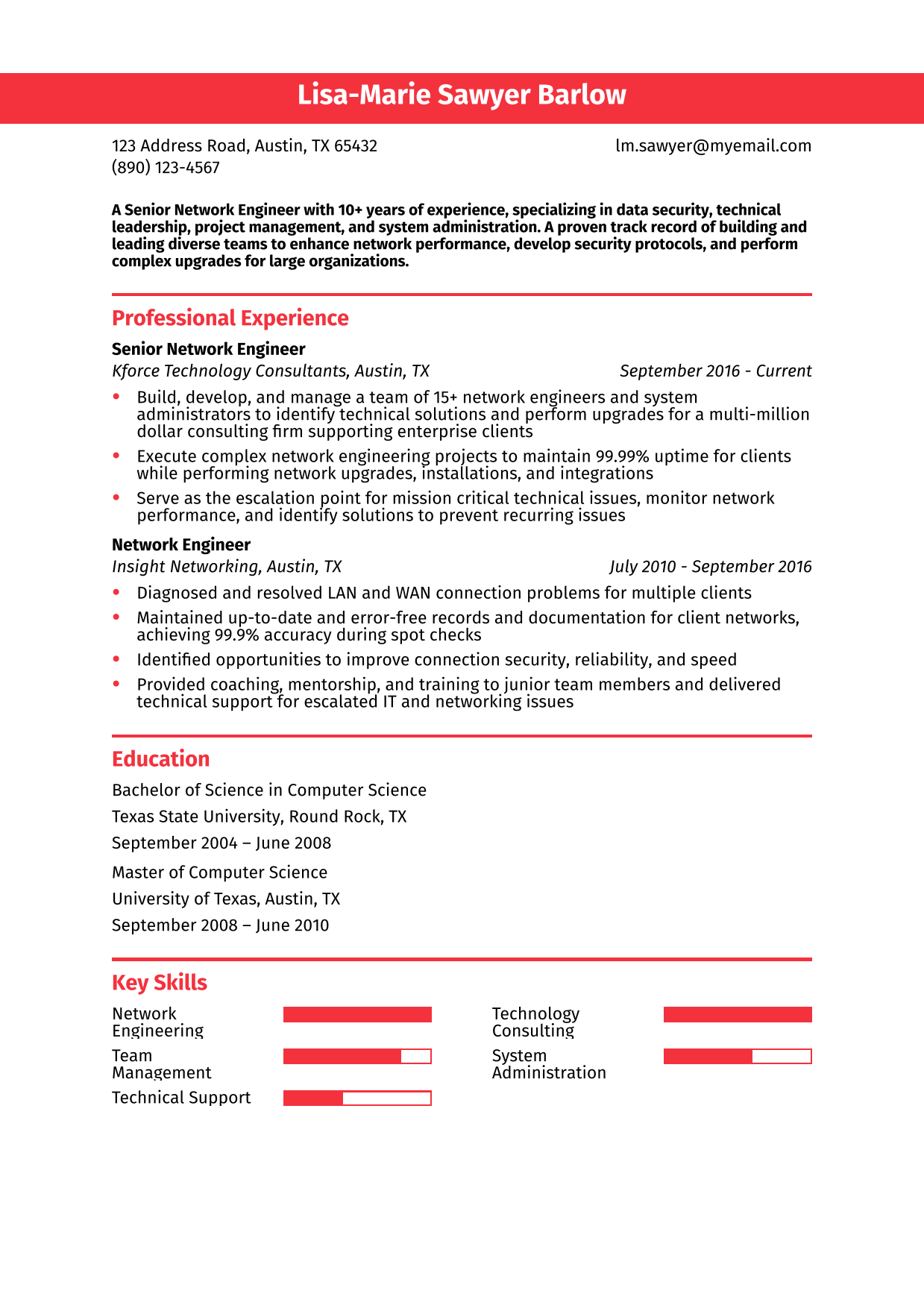
Why this Senior Network Engineer resume example is strong:
This resume demonstrates a combination of technical expertise and leadership experience, ideal for senior roles. Highlighting the management of a 15-person team and maintaining 99.99% uptime showcases the candidate’s impact on network stability. Including details on responsibilities and metrics helps the resume capture measurable impact, which is critical for experienced roles. The resume summary examples provide guidance for presenting a balanced profile of leadership and technical skills.
Cybersecurity Network Engineer Resume Example
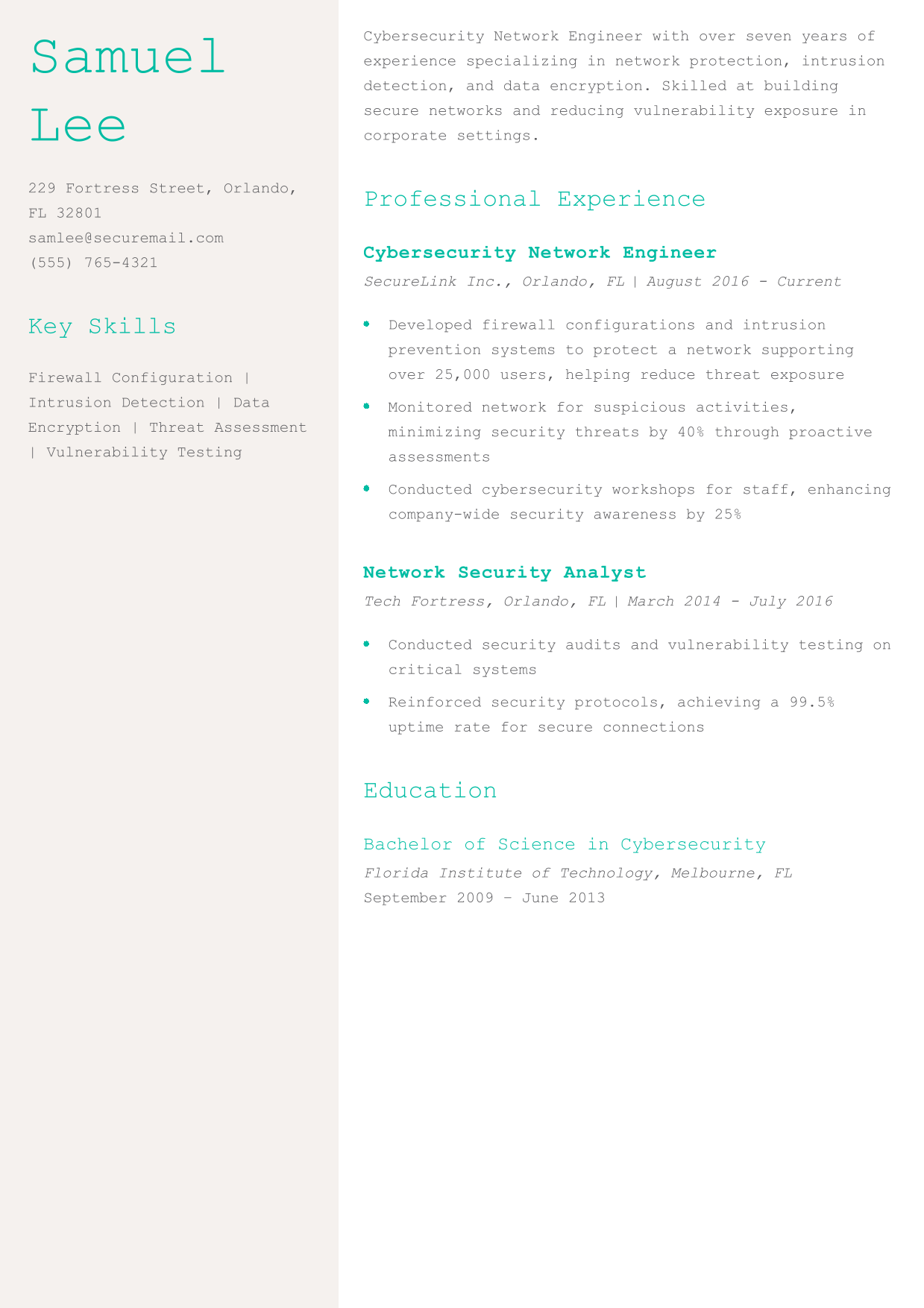
Why this Cybersecurity Network Engineer resume example is strong:
This resume emphasizes cybersecurity-specific skills and accomplishments in threat prevention and staff training, which are vital in protecting networks. The candidate’s contributions to team training and proactive threat assessment align well with security-focused roles, as shown in the resume objective examples, helping position this resume for success.
Cloud Network Engineer Resume Example
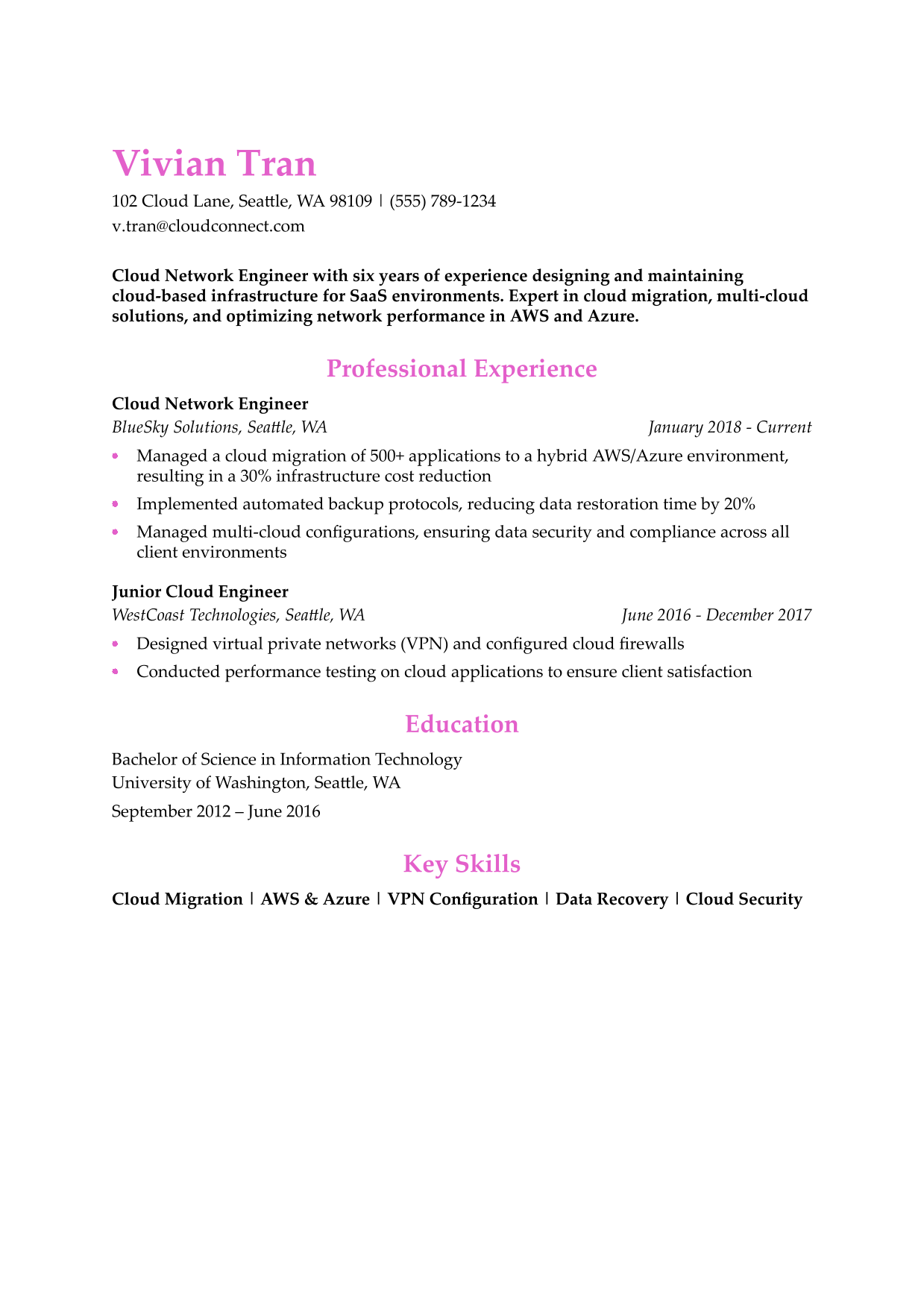
Why this Cloud Network Engineer resume example is strong:
This resume showcases the candidate’s expertise in cloud environments and cost-saving strategies, which add value to a cloud engineering role. Highlighting achievements like infrastructure cost reduction strengthens this resume for employers focused on efficiency. For more on showcasing technical expertise effectively, visit resume skills.
VoIP Network Engineer Resume Example
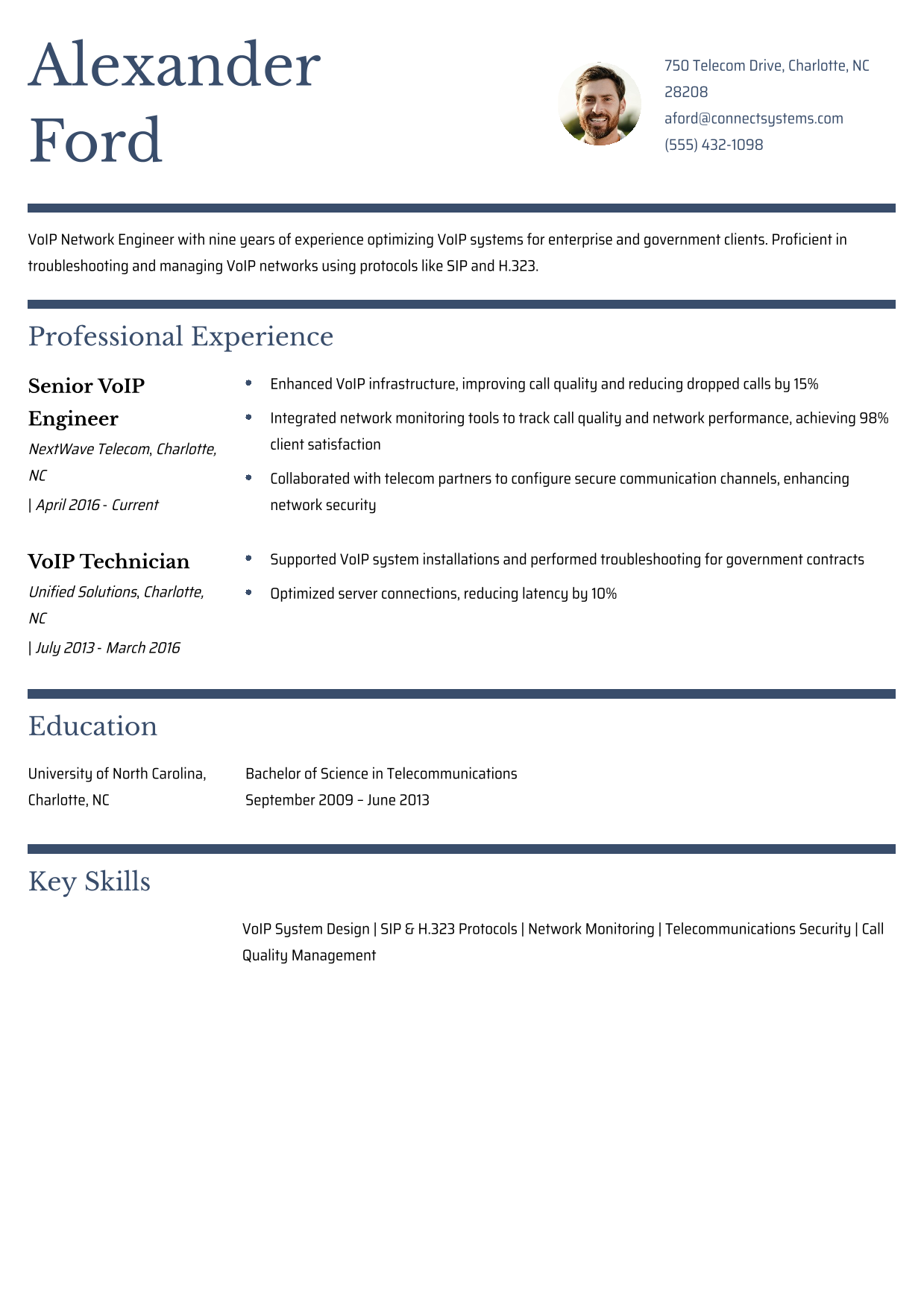
Why this VoIP Network Engineer resume example is strong:
This resume highlights specialized VoIP skills and shows measurable improvements in network performance, which is essential for roles focused on VoIP networks. Including specific protocols such as SIP and H.323 positions the candidate as a highly qualified VoIP engineer. Learn more about highlighting niche skills in resume summary examples.
Wireless Network Engineer Resume Example
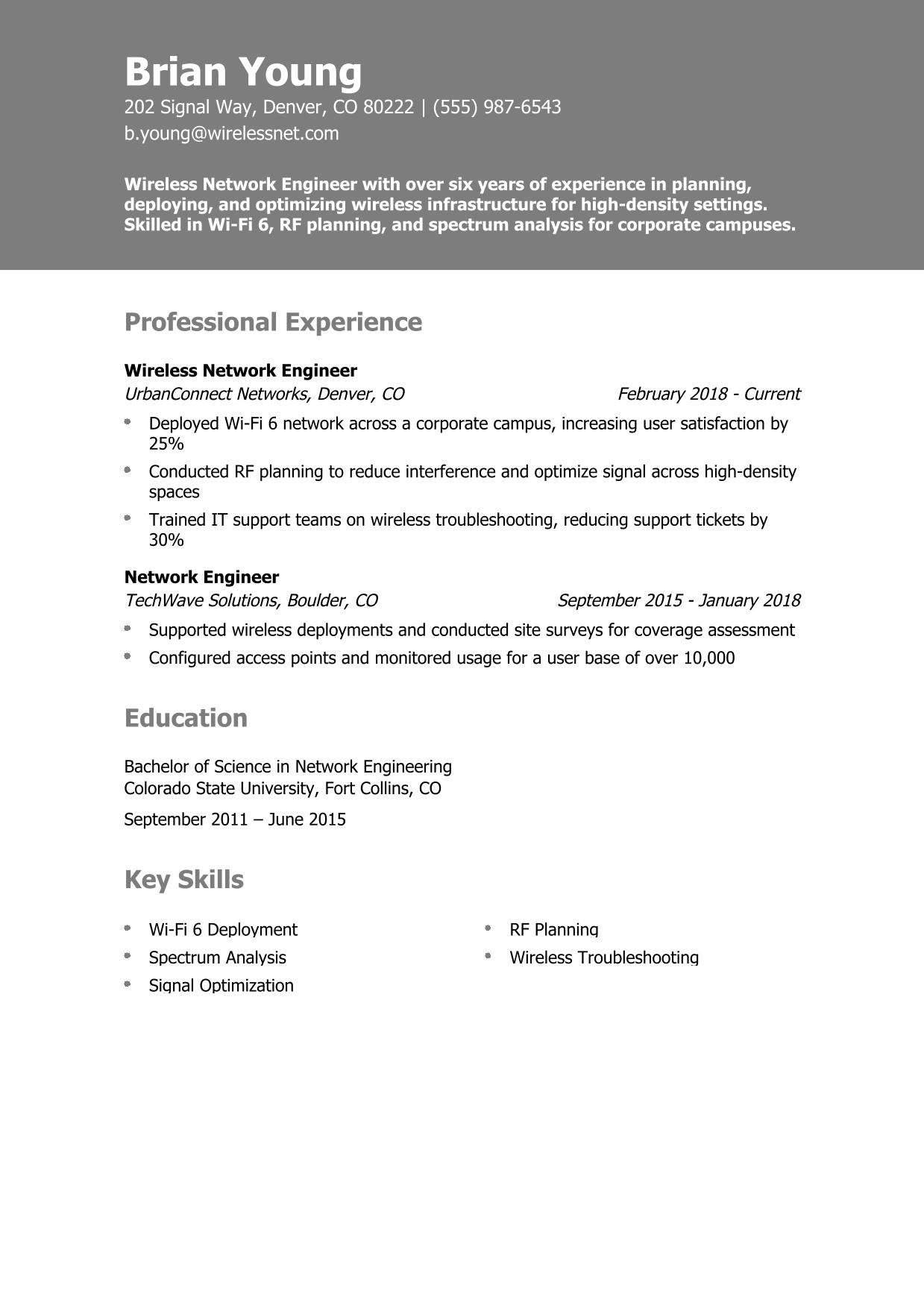
Why this Wireless Network Engineer resume example is strong:
By focusing on wireless network skills and notable achievements in user satisfaction and training, this resume appeals to employers needing wireless network expertise. Including specific technical skills like RF planning and Wi-Fi 6 deployment is a great way to capture attention for specialized roles. For advice on structuring your technical resume, check out best resume formats.
Our templates are crafted by professional resume writers to make creating your resume quick, easy, and effective.
- Professional resume template downloads
- Customized cover letter generation
- AI resume writing support
- Career-building resources and advice
Network Engineer Text-Only Resume Templates and Examples
How To Write a Network Engineer Resume
1. Write a dynamic profile summarizing your network engineer qualifications
Distill your network engineering career into a few sentences with a compelling summary of your qualifications. The first sentence should contain your job title, years of experience, and a few key specializations to pique the reader’s interest. Highlight skill sets that align with the needs of the organization you’re applying for. In the subsequent sentences, emphasize your contributions to the field.
Show your ability to collaborate with cross-functional teams and communicate technical information in a way everyone can understand. Mention your commitment to reducing network downtime by a certain percentage or enhancing network efficiency through automation. Give potential employers insights into how your professional background will bring value to their organization.
Senior-Level Profile Example:
A senior network engineer with over 10 years of experience specializing in data security, technical leadership, project management, and system administration. A proven track record of building and leading diverse teams to enhance network performance, develop security protocols, and perform complex upgrades for large organizations.
Entry-Level Profile Example:
A network engineer with entry-level experience specializing in the administration and development of network, server, and security protocols. A proven track record of collaborating with diverse technical teams to enhance network functionality.
2. Add a compelling section featuring your network engineer experience
Make it easy for readers to understand your contributions in previous roles by listing career accomplishments instead of daily tasks and responsibilities. This strategy helps hiring managers envision your success in previous positions and how you can do the same for their company.
As you consider your achievements, prioritize showing how you achieved tangible results using action verbs, data, and metrics. Describe your ability to diagnose and solve network issues, or give details on how you implemented disaster recovery plans and reduced recovery time during critical outages. Provide tangible examples of using your technical expertise to drive continuous improvement and engineering excellence.
Senior-Level Professional Experience Example:
Senior Network Engineer, Kforce Technology Consultants, Austin, TX
September 2016 – present
- Build, develop, and manage a team of over 15 network engineers and system administrators to identify technical solutions and perform upgrades for a multi-million dollar consulting firm supporting enterprise clients
- Execute complex network engineering projects to maintain 99.99% uptime for clients while performing network upgrades, installations, and integrations
- Serve as the escalation point for mission critical technical issues, monitor network performance, and identify solutions to prevent recurring issues
Entry-Level Professional Experience Example:
Network Specialist, University of Nevada, Las Vegas, Lee Business School, Las Vegas, NV
January 2020 – present
- Develop application solutions for senior staff to seamlessly access the school network, implement network solutions to ensure data security and prevent ransomware attacks, and identify opportunities to improve network functionality
- Coordinate with technical teams to develop and implement network solutions for four University of Nevada, Las Vegas campuses with over 80,000 users
- Deliver presentations to the dean and university administration on network health
3. Include network engineer-related education and certifications
Provide employers with a list of any relevant and required degrees. Outside of college education, include any pertinent IT certificates you’ve earned. Although employers may not require certifications, these credentials prove you’ve obtained specialized knowledge and are committed to professional development.
As one of the largest networking companies in the industry, Cisco offers a Certified Network Associate (CCNA) certification which covers the fundamental aspects of networking. This is a great option for entry-level engineers. Cisco also provides credentials at the mid-career and expert levels.
Education
Template
- [Degree Name]
- [School Name], [City, State Abbreviation] – [Graduation Month and Year]
Example
- Bachelor of Science, Management Information Systems (MIS) with a minor in Computer Science
- Northwestern University, Evanston, IL, January 2007 – May 2012
Certifications
Template
- [Certification Name], [Awarding Organization] – [Completion Year]
Example
- CCIE-Security, December 2019
- Python Programming for Networks from Google, March 2020
4. List key skills and proficiencies for network engineers
Employers often get many applications for network engineering jobs, and hiring managers simply don’t have the time to read through each resume in detail. Instead, organizations use applicant tracking systems (ATS) to scan for the key skills and action verbs they seek, filtering out top candidates for further consideration.
To generate job interviews, incorporate skills and technology concepts that match the job description. Take a look at the list of industry-appropriate keywords below to get an idea of the types of language you could include on your network engineer resume:
| Key Skills and Proficiencies | |
|---|---|
| Agile methodology | Coding languages |
| Configuring firewalls | Cross-functional leadership |
| Cybersecurity | Dynamic Host Configuration Protocol (DHCP) |
| Diagnosing system faults | Domain name system (DNS) |
| IT | Local area network (LAN)/campus area network (CAN)/wide area network (WAN) |
| Network design | Network engineering |
| Process improvement | Project management |
| Scrum | Security management |
| Sourcing equipment | Structured query language (SQL) |
| System administration | Technical support |
| Troubleshooting | Updating networks |
5. Showcase your technical leadership capabilities
Leadership and cross-functional collaboration are essential when pursuing senior-level network engineering positions. Companies want to see you possess advanced technical knowledge and can be counted on to handle escalated issues.
Show employers you have the ability to build and manage a diverse team. Emphasize your history of cross-functional collaboration when executing complex network projects and demonstrate that you can excel as a technical subject matter expert and organizational leader.
How To Pick the Best Network Engineer Resume Template
Choose a template that looks clean, organized, and professional. Avoid overly flashy or colorful designs that might distract from the content. A minimalistic design often works well for technical roles, as it keeps the focus on your qualifications without unnecessary distractions. Remember that while a well-chosen template can improve the presentation of your resume, the content remains the priority. Hiring managers are more concerned with your potential value as an engineer, not how stylish your resume looks.
Frequently Asked Questions: Network Engineer Resume Examples and Advice
How do I ensure my Network Engineer resume example is ATS-friendly?-
To make your Network Engineer resume example ATS-friendly, focus on including relevant keywords from the job description and avoid using complex formatting like images or non-standard fonts. Keep the document simple and ensure each section is clearly labeled (e.g., Education, Professional Experience, Skills). The use of action verbs and proper section headings will also help your resume get noticed by both ATS and hiring managers.
What are common action verbs for network engineer resumes?-
It’s easy to get hung up when writing about your past experiences. Action verbs can help you accurately describe your accomplishments and allow employers to understand how you achieved results. Increase engagement and enhance your writing by using these powerful words. Differentiate your verbiage and avoid repetition when possible. Try out some of the action verbs below in the professional experience section of your network engineer resume:
| Action Verbs | |
|---|---|
| Analyzed | Configured |
| Created | Delivered |
| Designed | Developed |
| Diagnosed | Enhanced |
| Executed | Identified |
| Implemented | Improved |
| Installed | Led |
| Maintained | Oversaw |
| Sourced | Supported |
| Troubleshot | Updated |
How do you align your resume with a job description?-
Job opportunities for network engineers, also known as network and computer systems administrators, are expected to grow by 3% between 2021 and 2031. The job market for network engineers will likely be driven by companies upgrading their systems to incorporate new, fast-moving technologies.
A 3% growth rate is slower than the average for all occupations, which may make it difficult for you to find a job in this field. Many applicants make the mistake of sending out the same bland and generic resume to every vacancy they’re interested in as a time-saving exercise. You can capture a place on the call-back list by tailoring your resume to the skills and knowledge mentioned in the job listing.
For example, if an organization is looking for someone with operational experience in a Linux production environment, highlight your knowledge of Bash scripting and how you use it to automate tasks.
If a company seeks a network engineer with extensive technical project management experience, emphasize your knowledge of Agile, Scrum, and Waterfall methodologies.
What is the best network engineer resume format?-
The reverse chronological resume is the standard choice for most professionals. However, the combination format is an excellent choice for network engineer resumes. This format highlights both your technical skills and hands-on experience. It enables you to showcase your technical expertise up front but still gives space to detail your work history and accomplishments. For entry-level engineers, focus on showcasing your academic projects to compensate for a lack of professional experience.
What’s the recommended length for a network engineer resume?-
The recommended length for a network engineer resume is one page, especially for professionals with under 10 years of experience. A two-page resume can work for those with substantial accomplishments or a longer career, but only if it’s concise and highly relevant to the role. Tailoring your resume to the job and highlighting your strongest qualifications are key to success.
Stick to listing work experience from the last 10 to 15 years, as this period is most relevant to employers. Summarize or omit older positions unless they’re crucial for your application. A focused and streamlined resume will help capture the hiring manager’s attention.
Craft your perfect resume in minutes
Get 2x more interviews with Resume Builder. Access Pro Plan features for a limited time!

Writing a compelling cover letter increases your chances of landing an interview in your search for a network engineering position. The best way to create an effective cover letter is to tailor it to the organization you’re applying to. Learn how to do this in our comprehensive cover letter guide. For more inspiration, check out our computer science and software engineer cover letter guides.



